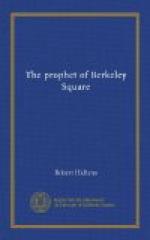“Well, and—”
“By hook and cook I got them to the library, sir. But the male person’s boots creaked awful. The getting on his toes, sir seemed to induce it, as you might say.”
“Yes, yes. So they’re in the library?”
“They are, sir, and have been talking incessant, sir, ever since they was put there. We can hear their voices in our hall, sir.”
Mr. Ferdinand again pursed his lips and looked like an elderly lady. The Prophet could no longer meet his eye.
“Bring some tea, Mr. Ferdinand, quietly to the library. And—and if Mrs. Merillia should ask for me say I’m—say I’m busy—er—writing.”
Mr. Ferdinand moved a step backward.
“Master Hennessey!” he cried in a choked voice. “I, a London butler, and you ask me to—!”
“No, no. I beg your pardon, Mr. Ferdinand. Simply say I’m busy. That will be quite true. I shall be—very busy.”
“Yes, sir,” said Mr. Ferdinand with a stern and at length successful effort to conquer his outraged feelings.
He wavered heavily away to fetch the tea, while the Prophet, like a guilty thing, stole towards the library. When he drew near to the door he heard a somewhat resounding hubbub of conversation proceeding within the chamber. He distinguished two voices. One was the hollow and sepulchral organ of Malkiel the Second, the other was a heavy and authoritative contralto, of the buzzing variety, which occasionally gave an almost professional click—suggesting mechanism—as the speaker passed from the lower to the upper register of her voice. As the Prophet reached the mat outside the door he heard the contralto voice say,—
“How are we to know it really is only ankles?”
The voice of Malkiel the Second replied plaintively,—
“But the gentleman who opened the door and—”
The contralto voice clicked, and passed to its upper register.
“You are over fifty years of age,” it said with devastating compassion, “and you can still trust a gentleman who opens doors! O sanctum simplicitatus!”
On hearing this sudden gush of classical erudition the Prophet must have been seized by a paralysing awe, for he remained as if glued to the mat, and made no effort to open the door and step into the room.
“If I am sanctified, Sophronia,” said the voice of Malkiel, “I cannot help it, indeed I can’t. We are as we are.”
“Did Bottom say so in his epics?” cried the contralto, contemptuously. “Did Shakespeare imply that when he invented his immortal Bacon, or Carlyle, the great Cumberland sage, when he penned his world-famed ’Sartus’?”
“P’r’aps not, my dear. You know best. Still, ordinary men—not that I, of course, can claim to be one—must remain, to a certain extent, what they are.”
“Then why was Samuel Smiles born?”
“What, my love?”
“Why, I say? Where is the use of effort? Of what benefit was Plato’s existence to the republic? Of what assistance has the great Tracy Tupper been if men must still, despite all his proverbs, remain what they are? O curum hominibus! O imitatori! Servus pecum!”




